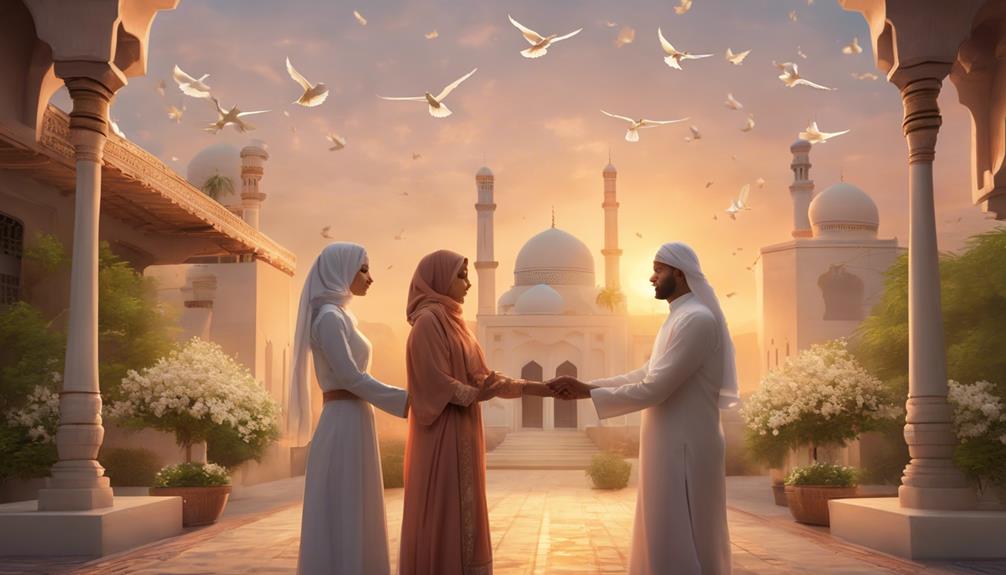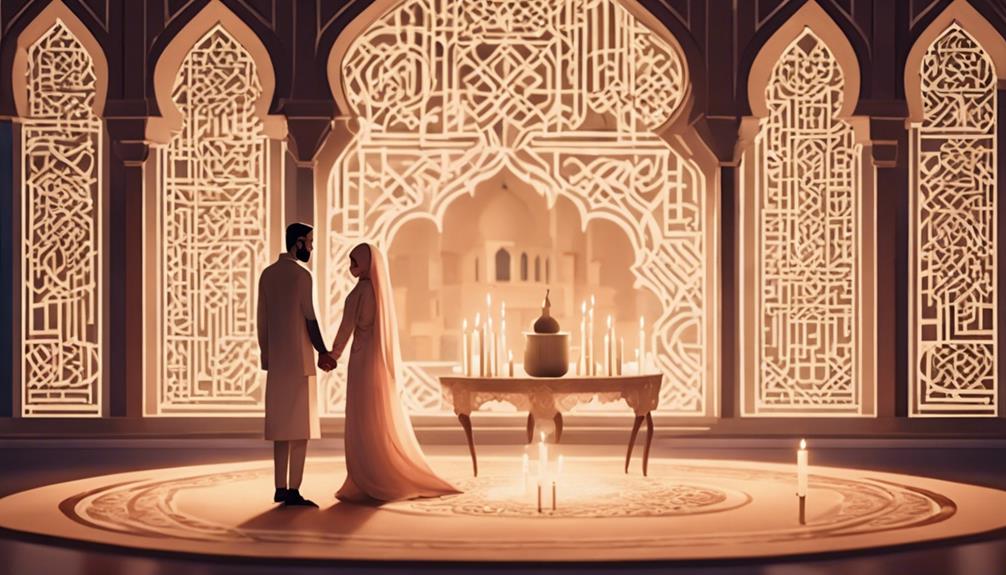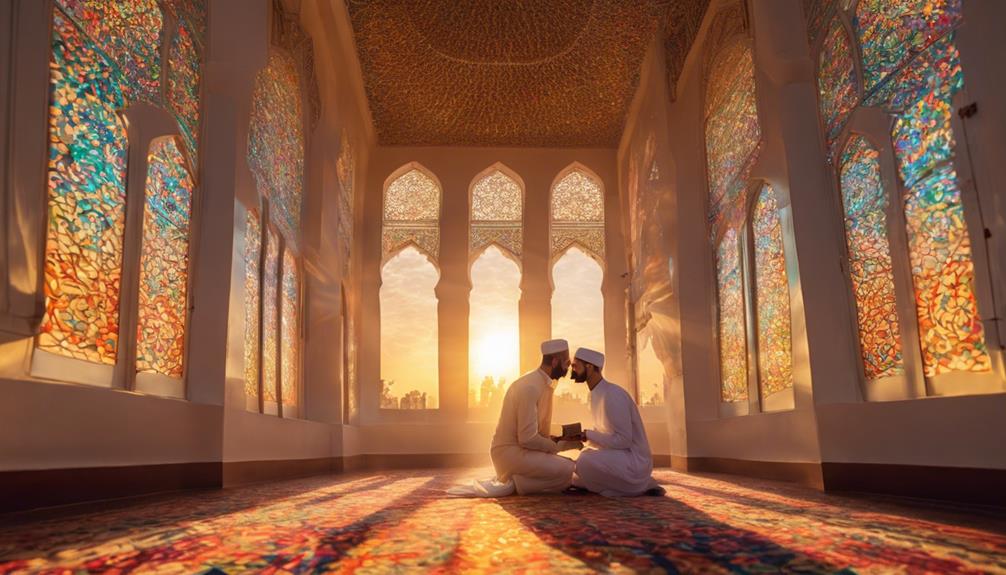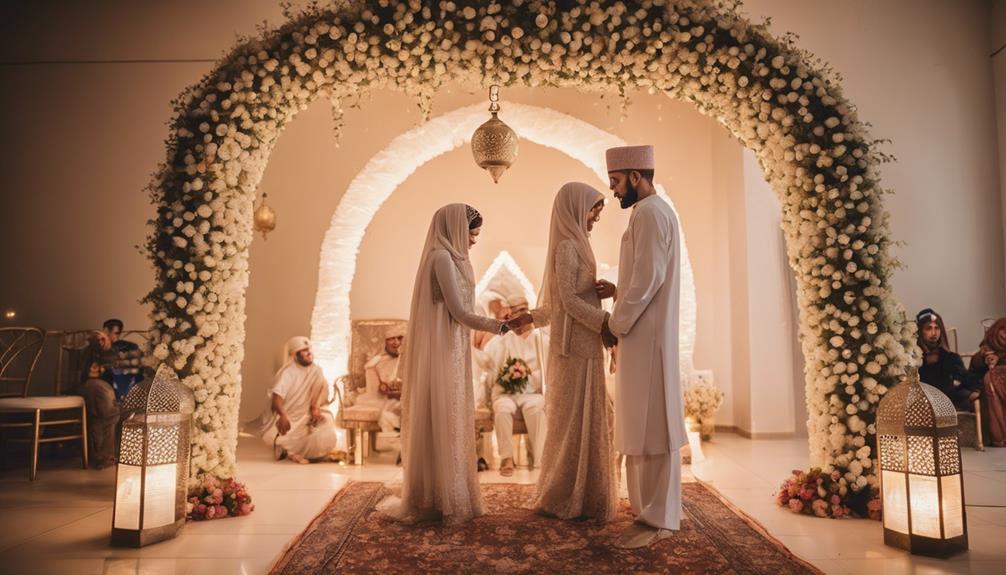In Islam, marriage isn’t just a personal decision but a profound journey towards spiritual growth. It nurtures love, mercy, and tranquility, promoting mutual encouragement in faith. Marriage offers companionship, providing emotional security through respect and kindness. It allows for lawful fulfillment of desires, fostering deep emotional and physical intimacy and protecting against sin. Additionally, it lays the foundation for families, instilling moral values in children and strengthening communities. Marrying is seen as a religious duty aligned with the Sunnah of Prophet Muhammad (pbuh), offering spiritual rewards and peace. There’s much more to uncover about this sacred bond.
Spiritual Growth and Fulfillment

In Islam, marriage is more than just a social contract; it’s a pathway to spiritual growth and fulfillment. Your journey into married life is seen as a profound step towards achieving spiritual advancement. The Holy Quran describes marriage as a divine sign, meant to instill love, mercy, and tranquility in your life. These elements aren’t just beneficial for your emotional well-being but are essential for spiritual fulfillment.
By entering into this sacred bond, you’re not just fulfilling a natural desire but also initiating a path that aids in completing half of your religion.
The tradition of the Prophet Muhammad (pbuh) underscores the significance of marriage in fostering an environment conducive to spiritual growth. A faithful partner can be your greatest ally in adhering to religious practices, motivating you to perform your obligations with sincerity. This mutual encouragement strengthens your spiritual connection, enhancing your moral development.
Within the framework of marriage, engaging in lawful relations is considered virtuous, fortifying the bond between you and your spouse. Consequently, marriage in Islam isn’t just a personal commitment; it’s a divine opportunity to grow spiritually and fulfill your religious duties.
Companionship and Emotional Security
Marriage in Islam is a partnership that emphasizes companionship and emotional security. As a religious person, you understand that a husband and wife are meant to be each other’s source of peace and comfort. This idea is beautifully encapsulated in Surah Ar-Rum (30:21), where the Quran highlights the importance of companionship.
In this sacred bond, you find someone to share life’s joys and sorrows, fostering a sense of emotional security and support. This emotional security stems from mutual respect and kindness, which are essential for maintaining a nurturing and loving relationship. You and your spouse are encouraged to build this supportive environment together, ensuring that both of you feel valued and understood.
Sharing your life with a partner contributes to personal happiness and stability, as you confront challenges with the assurance of a supportive person by your side.
Moreover, companionship in marriage isn’t just about emotional fulfillment; it also plays a significant role in your spiritual growth. You and your spouse can encourage each other in faith and moral development, helping each other become better individuals.
Through this partnership, you can achieve greater spiritual fulfillment and growth in your religious journey.
Lawful Fulfillment of Desires

While companionship and emotional security form the heart of a marital relationship, fulfilling natural desires within a lawful framework is equally significant. For many young men, marriage provides a structured and sacred environment for engaging in sexual intercourse, which is a primary purpose of marriage in Islam. The Quran emphasizes this lawful fulfillment of desires, illustrating how marriage acts as a shield against sin and temptation.
By choosing to marry, you embrace a framework that allows for:
- Lawful sexual relations: The term “nikah” underscores the importance of sexual intercourse within a marital context, highlighting its sanctity.
- Protection from sin: Marriage helps protect individuals from succumbing to uncontrolled urges, promoting chastity and moral integrity.
- Emotional and physical intimacy: The intimate bond between married people fosters mutual support and companionship, key elements in a successful marriage.
- Enhanced spiritual focus: When desires are fulfilled lawfully, you can concentrate better on spiritual growth without distractions.
Thus, the purpose of marriage extends beyond companionship to include the lawful fulfillment of desires, ensuring a balanced life. It’s not just about personal satisfaction but also contributes to a harmonious and morally upright community.
Foundation for Family and Community
Often, marriage in Islam serves as a fundamental institution for building families and nurturing communities. When you decide to marry, you’re not just forming a bond with your spouse; you’re laying the groundwork for a stable family unit.
The Quran beautifully describes marriage as a divine sign, highlighting its role in fostering love, compassion, and mutual support. Through marriage, you contribute to creating a nurturing environment where children can thrive, benefiting from emotional security and a strong sense of belonging.
By establishing a family, you play an essential role in enhancing the community’s stability. Stable families often lead to reduced societal issues like crime and poverty, as they instill moral values and cultural traditions in the next generation.
This collective strength enriches the social fabric, making the community more resilient and harmonious.
Moreover, the nurturing environment provided by married families guarantees children grow up with a clear understanding of their identity and values. They learn to appreciate the importance of community cohesion and social responsibility.
Sunnah and Religious Duty

In Islam, some might view getting married as more than just a personal choice; it’s a religious duty and a practice deeply rooted in the Sunnah of Prophet Muhammad (pbuh).
By embracing marriage, you’re not only following a tradition that brings immense spiritual rewards but also fulfilling a crucial religious obligation. The Quran encourages marriage as a path to peace and tranquility, reinforcing its role as an essential component of Islamic life.
Consider these compelling reasons:
- Following the Sunnah: By marrying, you’re emulating the Prophet’s life, which is a noble pursuit in itself.
- Fulfilling Religious Duty: Marriage is seen as a safeguard against sin, protecting you from temptation and aligning your life with Islamic teachings.
- Achieving Spiritual Rewards: Engaging in marriage is linked to the fulfillment of half of your religion, offering spiritual growth.
- Strengthening the Community: Marriage contributes to the stability and development of the Muslim ummah, supporting communal growth and moral values.
Ultimately, marriage is more than a personal milestone; it’s a means to strengthen your faith, enhance your spiritual journey, and contribute to a thriving Islamic community.
Conclusion
In considering marriage within Islam, you’re embracing a path that enriches your spiritual growth and fulfillment. You’ll find companionship and emotional security, while fulfilling desires lawfully. By marrying, you’re laying the foundation for a strong family and community, aligning with the Sunnah and fulfilling a religious duty. This sacred contract not only strengthens your faith but also creates a harmonious environment for future generations, making marriage a truly transformative and rewarding journey.



